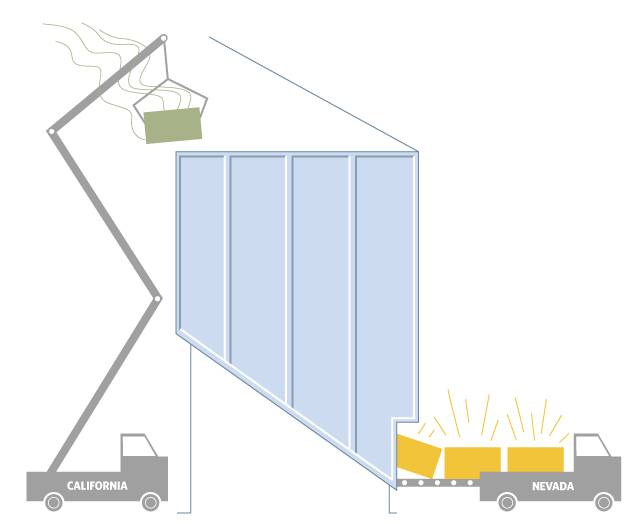Tuesday, Nov. 10, 2009 | 2 a.m.
Sun Archives
- German company plans LV site for waste-to-energy plant (2-13-2009)
- Trash-to-power plans tabled (1-16-2009)
- Boulder City to outsource trash-to-energy landfill plant (11-13-2008)
- Boulder City officials look into energy-producing landfill program (10-7-2008)
- Let me turn your trash into energy, entrepreneur urges cities (2-11-2008)
Sun Coverage
Californians are planning on dumping more of their garbage in Nevada, and federal law says Nevada can’t simply ban it, officials say.
So Gov. Jim Gibbons and others are proposing that Californians pay for a state-of-the-art recycling and waste-to-energy plant that could turn that garbage into much-needed revenue.
For starters, Nevada might be able to pull out recyclables and sell them on the market. However, San Francisco has a mandatory recycling program, so it seems unlikely that many recyclables from there will be left in the truckloads driven across the state line.
Another option, and one looking increasingly attractive, is to use the trash to create valuable fuel, electricity and biochar, a highly porous charcoal made from organic waste.
It’s not a far-fetched idea. Cities across the country burn their trash for energy. But it comes at the expense of air quality.
A group of Las Vegas investors say they have the perfect solution — a technology that turns garbage into energy without the usual air pollution. Concord Blue Energy is importing components for a 250-kilowatt chemically processed waste-to-energy demonstration plant that it plans to operate near McCarran International Airport.
This plant, in Paradise township, would be the first U.S. demonstration site. The company says it already has potential customers from throughout the nation lined up to fly in and check out the demonstration project.
Clark County officials are handling the final stages of permitting, and the company expects the plant components to arrive from India by the end of the month. The plant should be operational around the beginning of 2010, they say.
Concord Blue is the American licensee of a German operation that has plants operating in Japan and India. It also has a demonstration plant in Germany.
Unlike most waste-to-energy or biomass plants in the U.S., these plants do not burn waste in furnaces. Instead, they use a system in which the waste is decomposed through pyrolysis, which involves heating organic materials to a point where elements are separated, allowing ethanol, hydrogen and other valuable gases to be extracted. The system needs outside fuel (usually propane) to start the plant up, but after that, biochar fuels the process.
The system is considered environmentally friendly because it disposes of waste without generating massive greenhouse gas emissions or mountains of fly ash. A full-scale plant (about 20 times larger than the demonstration plant headed for Southern Nevada) has about the same emissions as a small car, Concord Blue says. The byproducts of the chemical process are a small amount of ash, which can be sold to cement manufacturers, and biochar, which is selling for about $150 a ton to compost makers and coal plants that burn the char for fuel.
Garbage-to-energy plants are considered renewable energy operations in Nevada thanks to changes made during the past legislative session. The plant planned for the Las Vegas area could consume one to three tons of garbage daily, depending on the type of waste fed into the system.
It is exactly the kind of thing lawmakers want to have in Northern Nevada, says Sen. Randolph Townsend of Washoe County, the GOP’s senior state lawmaker on energy issues.
Nevada is already a dumping ground for California. A dump near Reno takes in about 275,000 tons of trash from California each year. And there are permits for two other California dumps on Nevada soil. But Northern Nevadans have had their fill of their neighboring state’s garbage. San Francisco-based waste company Recology’s plan to haul up to 4,000 tons of trash a day and dump it near Winnemucca in exchange for about $1 million in annual fees has run into strong resistance. Locals fear the dump will put their underground water supply at risk and pollute their air, Townsend says.
“These waste-to-energy plants are a way to get rid of the trash in a way that makes sense,” Townsend says, noting that getting trash from California would just boost the economies of scale for Nevada waste-to-energy plants. “There’s value to this but the window of opportunity for Nevada is fairly small because everybody else is going to be looking at it as well. We should pursue this.”
Gibbons says he will propose legislation to reward waste managers for increasing recycling and for energy recovered from waste. He would also like to see incentives and tax abatements for recycling-related businesses that relocate to Nevada and low-cost financing for the construction of waste recovery facilities.
“We can conserve natural resources, create clean energy and create jobs by looking at landfills not as places where we bury our trash, but as places where recycling and energy recovery begin,” Gibbons says.


Join the Discussion:
Check this out for a full explanation of our conversion to the LiveFyre commenting system and instructions on how to sign up for an account.
Full comments policy